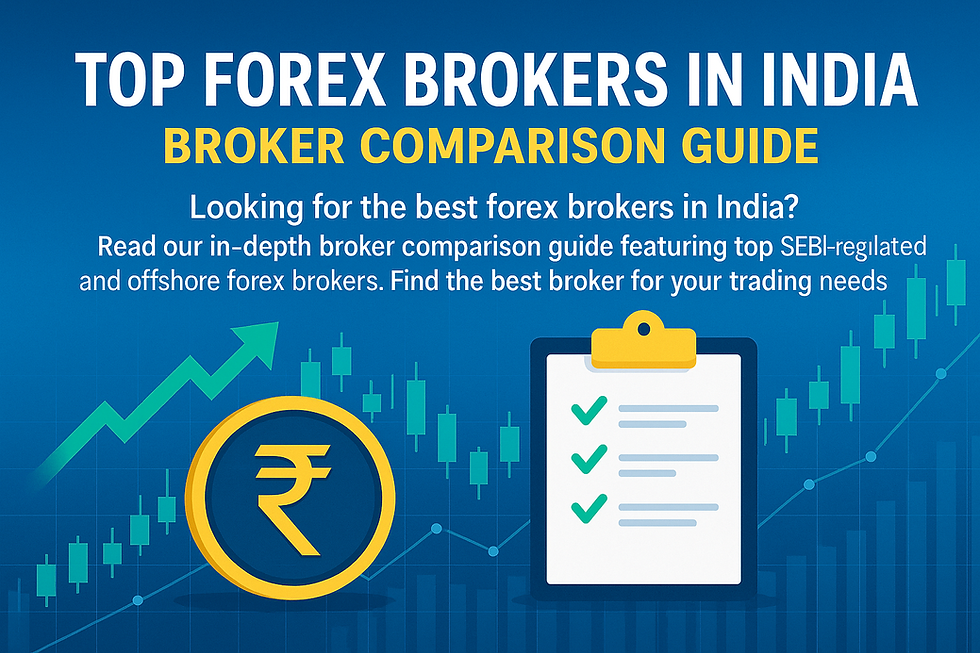Top Forex Brokers in India – Broker Comparison Guide
- Money Dox

- Jun 25, 2025
- 4 min read
Updated: Jul 1, 2025
Looking for the best forex brokers in India? Read our in-depth broker comparison guide featuring top SEBI-regulated and offshore forex brokers. Find the best broker for your trading needs today!

Introduction
What is Forex Trading and Why is it Coming to Rise in India?
Forex trading is the purchasing or selling of a currency pair in order to generate profit from market fluctuations. More and more people are turning to forex trading in India with increasing access to the internet, financial literacy, and global trading platforms. Most of them are now looking for the best forex brokers to perform trading without any hassle and profitably.
Importance of Getting the Right Brokers for Success
Selecting a reputable forex broker is the first step to success in trading. Good brokers usually set up a real trading environment, low fees, user-friendly platforms, and good customer support. The right broker guarantees smooth transactions, transparent pricing, and a fairly just experience in trading.
What This Guide Comprises
This guide caters to an all-around comparison of brokers, key factors for choosing one, expert recommendations, and insight into the best forex brokers in India. Whether you are a beginner or advanced trader, this brings you closer to making an informed decision.
Forex Trading in India: Rules & Regulations
Is Forex Trading Legal in India?
Forex trading in India is legal but highly regulated. The Reserve Bank of India (RBI) and Securities and Exchange Board of India (SEBI) monitor forex trading activities for regulations and also for the protection of investors.
RBI & SEBI Regulations for Indian Traders
Only brokers regulated by SEBI or banks are allowed to provide forex trading services.
Trading is permitted only for currency pairs where the Indian Rupee is one of the two currencies, for example, USD/INR, EUR/INR, GBP/INR, JPY/INR.
Trading with unregulated brokers is banned under the provisions of the Foreign Exchange Management Act (FEMA) with respect to offshore forex trading.
The Risks of Trading with Offshore Brokers
Severe lack of legal protection: SEBI cannot interfere in issues and disputes with offshore brokers.
Magnified risk of fraud: A good portion of unregulated brokers operate as a scam.
Little security for funds: Offshore brokers are most likely to be less stringent in observing the capital reserve requirements.
How to Compare Forex Brokers in India: Key Parameters
Regulation & Security
SEBI-regulated brokers for legal and financial protection.
Overseas brokers may offer maximum trading options but carry higher risk.
Trading Fees & Spreads
Low-cost brokers offer tight spreads and zero-commission trading.
Some charge fixed commissions but execute trades excellently.
Leverage & Margin
SEBI regulates leverage levels, preventing excessive risk-taking in trading.
While most Indian brokers provide leverage up to 1:50, offshore brokers usually provide 1:500+.
Deposit & Withdrawal Options
Preferred deposit and withdrawal options for Indian traders include UPI, bank transfers, and e-wallets.
Some offshore brokers will also accept cryptocurrency deposits.
Trading Platforms & Tools
The most popular are MetaTrader 4 (MT4) and MetaTrader 5 (MT5).
A few brokers also provide cTrader, proprietary platforms, and copy trading.
Customer Support and Reliability
Look for brokers with support services in multiple languages and available 24/7.
User reviews should be checked for complaint resolution efficiency.
Best Forex Brokers in India – Broker Comparison Table
Broker | Regulation | Fees | Platforms | Features |
Broker 1 | SEBI | Low | MT4, MT5 | Tight spreads, local deposit options |
Broker 2 | Offshore | Medium | cTrader, Copy Trading | High leverage, low commissions |
Broker 3 | SEBI | Zero | Proprietary | Best for beginners |
Broker 4 | SEBI | Low | MT4 | Best for mobile trading |
Broker 5 | Offshore | Medium | MT5, cTrader | Advanced trading tools |
Full Review of the Good Forex Brokers in India
Best Overall Forex Broker in India
Highlights: Low fees, high security, MT4 or MT5
Pros: SEBI regulated, tight spreads
Cons: Limited trading resources
Best Low-Cost Broker with Tight Spreads
Highlights: Zero commissions, low spreads
Pros: Awesome for scalpers with guaranteed execution
Cons: Limited leverage
Best for Beginner Traders and Learning Resources
Highlights: Educational material, demo account
Pros: User-friendly platform and complimentary training
Cons: Fewer advanced trading features
Best Forex Broker for High Leverage Indian Traders
Highlights: Up to 1:500 in leverage.
Pros: Excellent for the veteran trader.
Cons: Offshore referenced.
Best Mobile Trading Broker
Leverage: Cutting-edge mobile apps, quick execution.
Pros: Uninterrupted on-the-run trading.
Cons: Lesser in desktop feature functionalities.
Best SEBI Regulated Broker
Entirely compliant with all Indian regulatory standards.
Pros: Safe for Indian traders.
Cons: Limited leverage.
How to Open a Forex Trading Account in India
Step 1: Choose a Broker
Choosing a broker from a comparison list that finds fulfillment for your needs is the first step.
Step 2- Register and Verify Identity (KYC Procedure)
Pan card, Aadhaar, Bank details.
Step 3: Fund Your Trading Account
Deposits via UPI, net banking, or e-wallets are the modes of deposit.
Step 4: Trading Commences
Demo trading could be advanced to a live setting.
Common Mistakes to Avoid When Choosing a Forex Broker
Falling for Unregulated Brokers
Only SEBI-regulated brokers should be chosen for safety.
Ignoring Hidden Charges & Extremely High Spreads
Spreads, commissions, and withdrawal costs should all be compared.
Failure to Consider Customer Support Quality
Support operations must be available 24/7.
Selecting a Broker Without a Demo Account
Demo accounts are for practicing and testing strategies.
Conclusion: Which Broker Is for You?
Outline Summary: Choose brokers based on security, costs, and aspects of network platform technologies.
Tips: Kindly compare brokers against the table shared above.
Trade Safely: Avoid SEBI-regulated brokers to avoid legal scrapes.



Comments